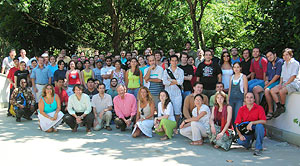Personal tools
News from ICTP 116 - Commentary

ICTP has partnered with Brazil's National Council for Scientific and Technological Development (CNPq) to hold joint scientific activities in Latin America.
ICTP in Brazil
When Erney Camargo, President
of Brazil's National Council for Scientific and Technological
Development (CNPq) met with ICTP director K.R. Sreenivasan during
the Centre's 40th anniversary conference, Legacy for the Future,
in October 2004, he came to convey more than his congratulations.
The day after the conference, Camargo and Sreenivasan signed a
memorandum of cooperation to establish a partnership between CNPq
and ICTP for jointly promoting "the development of schools
and workshops in mathematics and physics in Latin America."
The good intentions conveyed in the memorandum were recently transformed
into reality when the two institutions held a joint Workshop on
Dynamical Systems at the Instituto de Matemática Pura
e Aplicada (IMPA) in Rio de Janeiro in January. The workshop,
attended by 170 participants from 21 countries in Latin America,
covered such diverse topics as homoclinic bifurcations, strange
attractors and stochastic stability and hyperbolicity.
The Rio workshop was quickly followed by a School on Soft Matter
Physics, taking place at the Universidade de São Paulo
in February. The school, which attracted some 100 participants,
examined such issues as liquid crystals, polymers, granular matter
and non-equilibrium statistical physics.

School on Soft Matter Physics, Universidade de São Paulo, February 2006
"These research and training events," says Jacob Palis,
former director of IMPA who recently stepped down as chair of
the ICTP Scientific Council, "will seek to strengthen the
capacity of local and regional research, particularly in cutting-edge
fields. They are designed to attract advanced graduate students
and young post-doctoral researchers across the region as part
of a larger effort to improve their understanding of their major
fields of study and to put them in contact with others who share
their interests."
"The world has changed a great deal since ICTP was created
more than 40 years ago," says ICTP director K.R. Sreenivasan.
"Today, countries such as Brazil have the scientific capacity
to conduct research and training activities that meet the needs
of researchers not just in their own countries but throughout
the region. Holding ICTP-sponsored workshops and schools abroad
is not only cost-effective but also helps to build both confidence
and camaraderie among participants." If the workshop had
been held in Trieste instead of Rio, Sreenivasan estimates that
the same budget would have accommodated just 50 and not 170 participants.
"Brazil," notes Palis, "covers a substantial portion
of the cost of these events. As a result, we don't just benefit
from these activities but also shoulder financial and logistical
responsibility for organising them. ICTP also contributes to the
budget but much less than it would if the events were held on
its campus. The Centre," Palis adds, "also receives
more visibility in the developing world than it would if the activities
took place in Italy. For example, the Brazilian workshop and school,
largely because of the unique partnership they represented between
the developed and developing world, garnered press coverage in
both Rio de Janeiro and São Paulo."
Future plans call for holding similar joint events at institutions
not just in Brazil but in other countries in Latin America. In
2007, there will be a Latin American School in String Theory,
tentatively scheduled to take place in Buenos Aires, Argentina;
a Workshop on Probability Theory and Application, scheduled for
Brazil (but outside of Rio and São Paulo); and a Workshop
on the Geometry and Topology of Singularities, which will likely
take place in Cuernavaca, Mexico.
"We are off to a good start," says Sreenivasan. "We
are hoping that this joint venture in Latin America will not only
expand in the years ahead in Latin America but will serve as a
model that can be adopted by other regions in ways that transform
ICTP's relationship with institutions across the developing world
and help us all advance the lofty goals that we share."
Jacob Palis
Former Chairman, ICTP Scientific Council